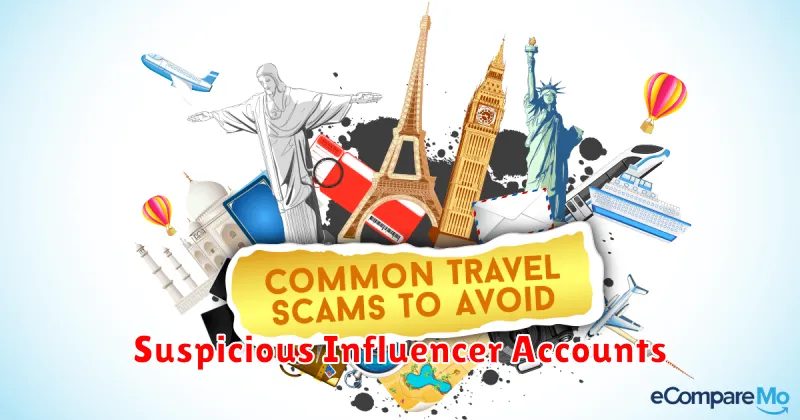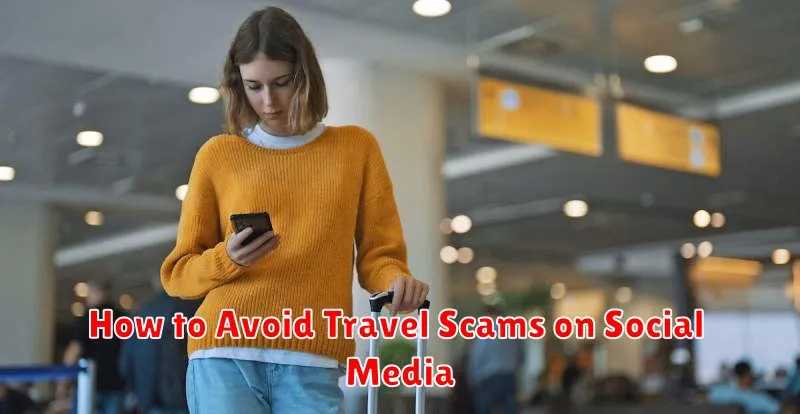Social media has become an invaluable resource for travel planning, offering inspiration and deals that are hard to resist. However, with the rise of travel influencers and eye-catching promotions, the risk of encountering travel scams on platforms like Instagram, Facebook, and TikTok has also increased significantly. Falling victim to these scams can lead to financial losses, ruined vacations, and identity theft. This article provides essential information on how to identify and avoid travel scams on social media, ensuring your dream trip doesn’t turn into a nightmare.
From fake airline ticket giveaways to deceptively discounted accommodations, travel scams take on many forms. Learning to recognize common red flags is the first step in protecting yourself. This article will equip you with the knowledge to spot social media travel scams, offering practical tips to verify deals, research travel influencers, and securely book your travel arrangements. By understanding the tactics employed by scammers, you can confidently navigate the digital landscape and plan your travels safely and effectively, avoiding the pitfalls of social media scams and enjoying a stress-free vacation.
How Scammers Use Social Platforms
Social media platforms, with their vast user bases and ease of sharing, unfortunately provide fertile ground for travel scammers. They exploit the visual nature of platforms like Instagram and Facebook, showcasing fake idyllic destinations or unrealistic travel deals to lure unsuspecting victims.
Impersonation is a common tactic. Scammers create fake profiles mimicking legitimate travel agencies or influencers, leveraging their perceived authority to gain trust. They may also hijack existing accounts, using stolen credentials to promote fraudulent offers.
Another tactic is using contests and giveaways. These often require users to share, like, or tag others, rapidly spreading the scam’s reach. While seemingly harmless, these tactics are designed to gather personal information or lead users to phishing websites.
Direct messaging is also frequently employed. Scammers may reach out with unsolicited offers or respond to comments on travel-related posts, initiating conversations that quickly lead to requests for payment or personal details.
Fake Giveaway and Free Trips
One common travel scam involves fake giveaways or free trips. Scammers create illusion of luxury vacations or free airline tickets to lure unsuspecting victims.
These scams often require you to follow, share, or tag friends to enter. While some legitimate giveaways exist, be wary of offers that seem too good to be true. Scrutinize the account hosting the giveaway. Look for verified accounts, a history of legitimate activity, and clear terms and conditions. If the account is new, has few followers, or posts primarily about giveaways, it’s likely a scam.
Avoid clicking on suspicious links or providing personal information, particularly credit card details, for “processing fees” or “taxes”. Legitimate giveaways rarely require such upfront payments.
Too-Good-To-Be-True Deals

One of the most common tactics scammers use is offering incredibly low prices on flights, accommodations, or complete vacation packages. These deals often exploit the desire for budget travel, appearing irresistible. However, if a deal seems too good to be true, it probably is.
Red Flags: Prices significantly lower than competitors, pressure to book immediately, requests for payment through unconventional methods (e.g., wire transfer, gift cards), and vague or nonexistent contact information for the supposed travel agency.
How to Avoid: Thoroughly research average prices for your desired trip. Compare the offer with reputable travel agencies and websites. If the price difference is dramatic, be wary. Verify the legitimacy of the company offering the deal by checking reviews and confirming their registration with relevant travel authorities.
Suspicious Influencer Accounts

One crucial aspect of avoiding travel scams involves scrutinizing influencer accounts. Look for inconsistencies in their posts. Does the quality of photos or videos vary drastically? Do locations or experiences seem improbable given their established profile?
Check for a disproportionate number of sponsored posts. While influencers often partner with brands, an overwhelming focus on promotions may signal a prioritization of profit over genuine travel experiences. A genuine influencer will likely mix sponsored content with personal travel stories and experiences.
Examine the engagement on their posts. A high follower count doesn’t always translate to authentic engagement. Look for real comments and replies. Generic, repetitive, or bot-like comments could indicate bought followers or engagement, a red flag for potentially dubious activity.
Investigate the account’s history. Has the account been around for a while, or is it relatively new? While new accounts aren’t inherently suspicious, longevity can build trust. Rapid growth in followers or engagement might also warrant further investigation.
Clickbait Travel Ads

Clickbait is a common tactic used in fraudulent travel advertising. These ads often feature unrealistically low prices or overly glamorous destinations to lure unsuspecting victims. They prey on the desire for affordable travel and create a sense of urgency to book quickly before the “deal” disappears.
Common clickbait phrases include “limited-time offer,” “unbelievable deals,” “dream vacation for pennies,” and similar hyperbolic language. Often, the ads use eye-catching visuals and emotive language to further entice potential victims.
These ads often lead to fake booking websites or phishing scams designed to steal personal and financial information. Be wary of ads that redirect you to unfamiliar websites or require upfront payment without providing legitimate booking confirmations.
How to Verify Travel Offers
Scrutinizing travel deals found on social media is crucial to avoid scams. Independently verify any offer before committing. Don’t rely solely on information presented on social media platforms.
Check the company’s website. A legitimate travel company will have a professional website with clear contact information, terms and conditions, and a privacy policy. Look for secure booking processes (https) and verifiable business addresses.
Research the company’s reputation. Search for reviews and ratings on reputable travel review sites. Be wary of overly positive reviews, especially if they appear generic or lack specific details.
Contact the company directly. If you have any questions or concerns, contact the company through their official website or phone number. Be suspicious of offers that pressure you to make a quick decision or provide personal information via social media direct messages.

